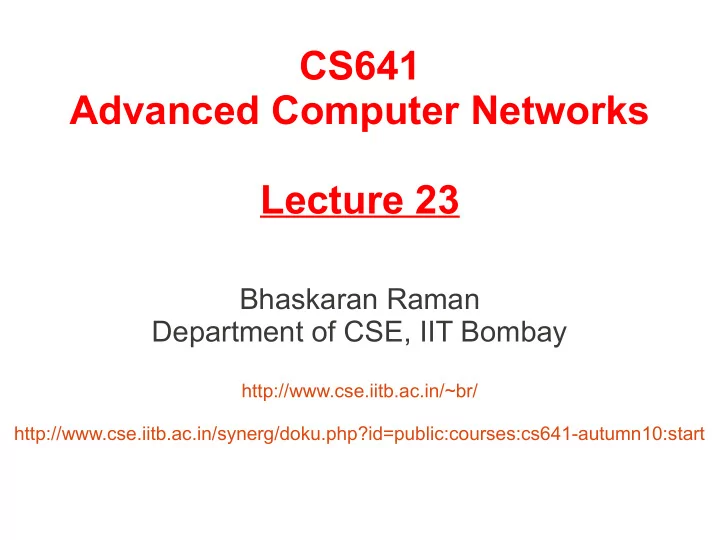

CS641 Advanced Computer Networks Lecture 23 Bhaskaran Raman Department of CSE, IIT Bombay http://www.cse.iitb.ac.in/~br/ http://www.cse.iitb.ac.in/synerg/doku.php?id=public:courses:cs641-autumn10:start
Outline for Today ● Next designated reading: – Due Mon 27 Sep 2010: [CSZ92] David D. Clark, Scott Shenker, and Lixia Zhang, “Supporting Real-Time Applications in an Integrated Services Packet Network: Architecture and Mechanism”, ACM SIGCOMM, Aug 1992, pp. 14-26. ● Resource reSerVation Protocol (RSVP)
Components of QoS ● Flow specification (flowspec) ● Routing ● Resource reservation ● Admission control ● Packet scheduling
RSVP: Resource ReSerVation Protocol ● Signaling to allocate resources in the network ● Strawman proposal: – Sender sends reservation message along path to receiver – Routers admit/reject flow – But, we want multipoint-to-multipoint communication (e.g. Video conferencing) – So, extend proposal: source sends reservation request to all receivers – But several problems...
RSVP: Design Goals ● Accommodate heterogeneity – In receiver's network capacity, receiver capability ● Deal with dynamic group membership ● Allow application to specify aggregate resource needs ● Allow receivers to switch channels ● Adapt to changes in network routes ● Low control overhead ● Modularity
RSVP: Design Principles ● Receiver-initiated reservation – Receiver decides quality desired, based on its capacity, and cost – Scales better than sender-initiated mechanism ● More design principles...
RSVP: Packet Filters ● Separate from the reservation mechanism ● Different filtering styles: – No-filter: all sources of the multicast group use the reservation – Fixed-filter: fixed set of sources for whose packets the reservation will be used – Dynamic-filter: dynamic set of sources ● Why are fixed-filters required when dynamic filters are available?
RSVP: Soft-State ● Reservation messages are sent periodically ● How does receiver know the path along which to reserve? – Path message from source(s) to receiver(s) – Reserve message along reverse path ● Path message contents: – Flowspec, F-flag to indicate if filters are allowed ● Reserve message contents: – Flowspec, Filter specification
RSVP: Soft State (continued) ● Path/Reserve messages install path/reservation state at routers – Aggregate state for no-filter/fixed-filter – Per-receiver state for dynamic-filters ● Path-state, and soft-state time-out if not refreshed – No explicit tear-down required – Only way to delete no-filter/fixed-filter reservations – Deals with dynamic membership elegantly – Also with dynamic route changes
RSVP: Modularity ● Independent of flow-spec ● Admission control mechanism has to return admit/reject ● Packet scheduling should be able to change filters dynamically ● Independent of routing
Upcoming Topics ● QoS: IntServ, DiffServ
Recommend
More recommend